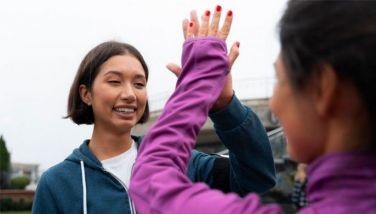A tale of two marathons
Win! Finish in four ‘howrs.’” read the delightful card, misspelled word and all, which my son made for me the night before I left to run in the Hong Kong marathon. I wondered though if it was a sign that I wasn’t going to meet my goal of finishing the race in less than four hours. But then there was also my older daughter’s card which said, “You will never know how it will end until it ends.” She also added a Celtic verse for conquering dragons. I found it a curious choice inasmuch as I was going to run in a land where its people proudly proclaim themselves as “descendants of the dragon.” Eastern dragons are totally different from their Western counterparts though. In China, they are seen not only as powerful but also beautiful, friendly, and wise. The dragon that I needed to slay was more like St. George’s monster. And before I could even get the chance of cutting off the creature’s head, I would first have to race through the entire length of its vicious 42-kilometer-long tail.
I carefully returned the cards inside my bag and then called home. I sighed sheepishly at already feeling homesick when I hadn’t even left yet. Near the departure gate where I waited, I noticed that about half of the passengers were overseas Filipino workers (OFWs). I wondered how the OFWs, particularly the mothers and fathers among them, dealt with homesickness. Although I myself lived abroad for about 10 years, I had the good fortune of being on an executive expatriate package. Moreover, except for one of those years, I had my family with me all the time. How hard it must be to be forced by economic necessity to leave your family and friends, to be separated from your spouse, and to all but miss out on your children growing up. Before we took off, I found myself humming a song I learned by heart during the days when I still traveled heavily for work:
Homeward bound, I wish I was homeward bound
Home, where my thought’s escaping
Home, where my music’s playing
Home, where my love life’s waiting silently for me.
When we landed in Hong Kong, I immediately tried to focus on what I needed to do in the race. I lay in my hotel bed and mentally pictured myself running the reputedly very hilly course again and again. Running a marathon is as much a mental as it is a physical challenge. It is estimated that over the course of the 42-km. run, a runner’s feet would strike the ground over 50,000 times, pounding every single piece of bone and fiber in the body numb. Somewhere near the 30-km. mark, some runners (especially weekend warriors like me) may experience “hitting the wall” and develop an irresistible urge to stop. They literally run out of gas. It is at moments like those, when the feeling of helplessness tries to overwhelm you, that it becomes a predominantly psychological contest. The lucky ones manage to somehow continue while others, weakened further by dehydration, cramps, or over-heating, simply stop dead in their tracks.
Restless, I left the hotel to explore on foot. I had previously made the mistake of walking around too much in the days before a race and paid dearly for it. I kept reminding myself to not do it again, but it’s hard not to walk around in Hong Kong. You tell yourself that you will stop at a certain point, but before you know it, you’re already way past it. I went on like that in circles up to the following day when I finally ended up at the Catholic Center in Central to hear Mass. It was a Saturday afternoon and the area was full of OFWs. We were packed like sardines inside the small chapel and the priest commented that it was always so when the service was announced beforehand as a “healing Mass.” I had been in Hong Kong for only two days and already, I felt so restive. What more, I thought, of these Filipinos, many of whom had no other place to sit and relax except on the steps of the pedestrian bridges outside? For sure, they were better dressed than many in Manila. And so, too, perhaps were their families and relatives back home whom they supported. Their smiles were genuine and they laughed as only Filipinos could. But there was a price to pay and the priest knew it only too well.
I got up before dawn on the morning of the marathon. The three alarm clocks that I set to make sure I didn’t oversleep ended up being useless as I kept waking up throughout the night to check the time. When I got off the train at Tsim Sha Tsui near the starting point, the underground station was already abuzz with hundreds of runners warming up. Above ground, the rest of the estimated 7,000 runners excitedly scurried about like shoppers chasing after one of Hong Kong’s famous bargains. I was so nervous I kept lining up at the portalets (portable toilets). As we massed at the starting line, I took several deep breaths and almost fainted as I inadvertently inhaled the strongest body odor imaginable from the runner next to me. It was so crowded I couldn’t see ahead, but I heard bagpipes and it seemed as if they had a Scottish band playing. We roared our readiness for battle and I felt like one of Mel Gibson’s Scottish warriors in the movie Braveheart.
The race started at the famous Nathan Road of Kowloon. From there, we headed towards the New Territories where we emerged from the Cheung Tsing Tunnel and climbed up a mountain until we reached the spectacular Tsing Ma Bridge (one of the world’s largest suspension bridges). After turning at the Ting Kau Bridge (the world’s first major four-span cable-stayed bridge), we headed back to Kowloon and crossed over to the Hong Kong side via the two-kilometer-long Western Harbor tunnel, immersed under 25 meters of seawater.
The last few kilometers of the race were in the hustle and bustle of the business district and ended at Victoria Park. It was indeed a merciless course. But it seemed that fate was smiling at me. I felt exultant as I approached the last five kilometers. I was way ahead of my goal of finishing in under four hours and for the first time since I started running marathons, I felt like I was beating and not just surviving it. But if there is one thing the marathon likes to teach, it is lessons in humility. At the end of the tunnel in Km. 37 was a near vertical incline that was about a kilometer long. I charged into it, foolishly thinking that I could finish at an even faster time. Both my thighs suddenly started to harden like cement. I was disconsolate. Not now! Not now! Not when victory was within my reach! I managed to shake it off somewhat by slowing down drastically, but it attacked me again at Km. 40 as about four to five more steep inclines were thrown in our path in the last kilometers of the race. Desperate, I started to chant my daughter’s Celtic verse, “Forge me with fire, a sword for smiting ... ”
I thought I heard someone say that there was only a kilometer left to go, but the finish line was nowhere to be seen. All I saw were the crowds of people along the winding road. I looked at my watch and knew it was going to be close. I then saw a small group of OFWs to my left and I shouted in the loudest voice I could muster, “Pilipinas!” At first, there was a quizzical look on their faces, as if they were wondering why this Chinese-looking runner was shouting to them in Tagalog. When it instantaneously dawned on them that I was Filipino, they smiled and waved. It gave me an adrenaline boost. I finally caught a glimpse of the finish line and gave it a final sprint. I was near tears as I looked at the clock — 3:59:47. I had slain my dragon!
Later, as I limped to the tram that would take me back to the hotel, I looked back and saw the hundreds of OFWs sitting outside on the grounds surrounding Victoria Park, taking a respite from the grind. It struck me how hundreds of tired runners were also doing exactly the same thing at that very moment inside the park. I then realized that these people were marathoners, too. But while my run was just for sport, theirs was a marathon of life. And although my race was done, and tomorrow I would be reunited once more with my family, their journey was not yet over. But no matter. I know they’ll never stop until they eventually find their way back home. For I had seen the words of Robert Frost written on their faces:
The woods are lovely, dark and deep,
But I have promises to keep,
And miles to go before I sleep,
And miles to go before I sleep.
* * *
Please e-mail your reactions to kindergartendad@yahoo.com.



















